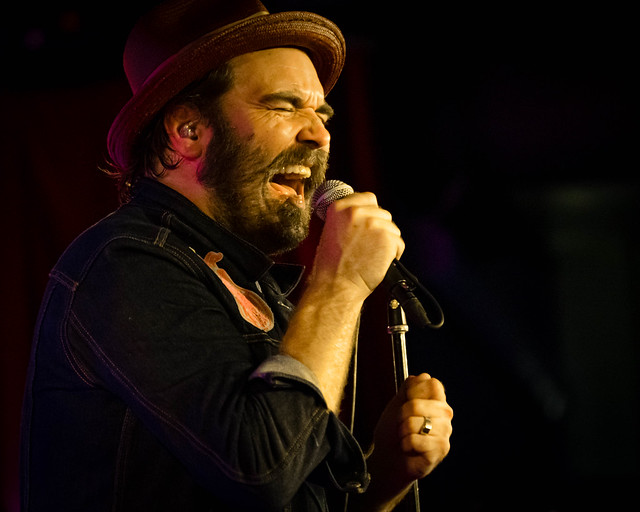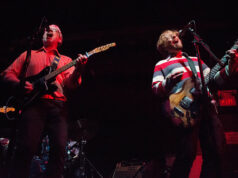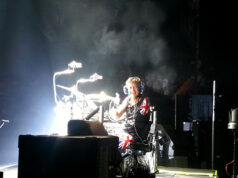
Red Wanting Blue frontman, Scott Terry, performing at City Winery DC, June 19, 2018. (Photo by Ari Strauss)
Red Wanting Blue will kick off its “25 and Still Alive” fall tour at The Hamilton Live this Friday Sept. 17. Before the show, lead singer Scott Terry spoke with Ari Strauss about reaching the band’s 25th anniversary, the upcoming tour, and the inherent philosophies in appreciating live and studio albums.
Ari had the opportunity to interview Scott once before in April 2020, and that is referenced in the dialog below. Red Wanting Blue was scheduled to perform at City Winery DC later that year but, of course, COVID-19 made that impossible.
Ari Strauss: The name of your upcoming tour is “25 and Still Alive.” Is that a reference to staying together as a band for twenty-five years or perhaps making it through the COVID-19 pandemic; or both?
Scott Terry: It’s a little bit of both. I’m very proud of [the band] turning twenty-five. But at the same time, based on our other conversation [last year] on how hard the pandemic has affected our industry, there’s something about survival. Really, more than ever, we can say, “We’re still alive! We’ve done it!” We should be happy for that. We can be grateful. So yeah, I’m kind of touching on both things.
Now, some of the more conservative members of our team were like, “I don’t know if we should go that route. It might seem insensitive [to those who lost a loved one to COVID]. And I said, “You know what, if there is going to be sensitivity on that level, we probably don’t want those people coming to the show…We’re commenting on ourselves. We’ve had a long rollercoaster of twenty-five years being together and if anyone wants to read into it more that that, it’s on them.”
Of course, we’re all extremely sensitive. I live in Brooklyn; I’ve got people who right away lost a lot of family and friends; so we’re all sensitive. But you know, every song, every song that was written prior to the pandemic that talks about loss, that talks about grief, you know…The pandemic has changed the meaning of everything. And I think you just have to accept that things mean what they mean and if you want to read additional things into it because of what’s gone on, sure, you can choose to do that. You can take the additional meanings; but I mean, no song means exactly the same thing now that it used to mean to me after what we all went through over the past year and a half.
Stream Red Wanting Blue’s latest Album, The Wanting, on Spotify:
ST: So, a tour named, “25 and Still Alive.” A) it rhymes — We’re turning twenty-five and I didn’t want to have a tour that said, “Hey, it’s Red Wanting Blue 25th Anniversary Tour.” I think that’s boring. I think that’s lame. I think we’re more clever than that; and b) it’s implying that we’re still here…Yes we’re still alive but I don’t know that we’re in perfect condition, as I feel the world is right now. Yes, we’re here. We’re doing okay, but we’re not at 100% back yet with everything. We’re showing some bruises and scars and experience with our age and more than anything, I hope our fans would have a smile when they saw that.
AS: It’s got a real punch to it. There’s a lot packed into just four words.
ST: Yeah, its celebratory and there’s some desperation too. It’s got an ominousness to it.
AS: Speaking of celebratory, I note that the last stop on the tour is a hometown show at the Atenaeum Theatre in Columbus, Ohio. Is that going to be a 25th Anniversary celebration-type show at the theater?
ST: For sure, oh yeah.
AS: Any chance another live album could come from it?
ST: Maybe. Very possible. You know, we did the RWB20 [concert album] for twenty years and right now where we’re at, we’re at the same place we were at when we made RWB20. We had exhausted touring on the last record. We started workshopping on what would become the new album, The Wanting, so we’re sort of in the spits of the same moment. We’ve exhausted touring on [The Wanting]. It came out in April of 2018, and we toured for a year and a half on that record and pretty much…we do the Rock Boat music cruise, the Sixth Man thing, and the last gig we had as a band was the festival. We came back from that, and it was the first week in February [2020] and we were like, “Okay, let’s start take the rest of the winter to work on a new album and we had a new tour scheduled for the spring, and that just never happened. So, obviously the pandemic changed the timing of how we work on stuff, and now here we are again, getting to that point in the fall where it could very well be a live record [in the offing.
AS: I use the RWB20 album a lot when I want to just shut the world out. I put in my earbuds in and pump it up and its about 90 minutes of pure nirvana for me.
Stream Red Wanting Blue’s RWB20, Live at Lincoln Theater on Spotify:
ST: HA! Oh man, that’s awesome. I really appreciate that. You know, it’s funny because I’m typically not a guy who likes live albums. I don’t historically like live albums. There’s a few that I think are unbelievable and I love them, but I just don’t naturally gravitate to like, “I want to hear the live record!” However, with our band, it feels…you know, making live records and studio albums are very different. Performing live and then performing live in a studio for the sake of making a record—its just different. It like you have a long game and a short game in golf and they are two completely separate skills required for the same game…And I’ve always been partial to, with our band, hearing live stuff. It sounds awesome. The energy is there because it’s a live record.
AS: That’s really interesting to me. As a listener, I prefer live music because I love the emotion and the grit, and hearing the audience sounds in the background—it adds dimension to the music that I don’t get from studio albums. I wonder, as an artist and somebody who knows the process of creating an album, if you are preferential to studio records because you’re picking up on things as an artist and someone who’s gone through the [recording] process that I wouldn’t understand as just a listener.
ST: Maybe. I think maybe on some level, but I also think its more about…Yeah, with a studio record you can listen to the process from a technical perspective and say, okay, I can tell that this record was recorded over the course of three days, and they had limitations with cost. This is a lo-fi record.
Or, this was recorded at Ocean Way Studios in Los Angeles and they had a 45-piece orchestra in the other room, and…you can think technically about all that stuff. But if you take all that shit away and just look at it like, this is someone getting a chance to put their paint on a canvas that’s perfectly blank, and this is what they’re saying and that can exist in a vacuum. You can put headphones on and close your eyes and know this is the world that they wanted me to hear. This is their music; this is their message; this is what they are saying.
And whether you know it or not, if you’re paying attention to it and pressing play, you’re giving them your undivided attention. As opposed to a live record, I think that is the culmination of people having their own personal experiences with the music, all coming together to have a shared experience with that music. Which is why its…I mean the joy and the energy that comes from it is always like, “Wow, it’s so great!” But at the same time. It’s a different experience hearing people cheering and stuff.
One of my favorite things of all time on a live album is hearing Simon and Garfunkel’s Concert in Central Park in the song, America, sing, “Counting the cars on the New Jersey Turnpike” and literally the entire park erupts so much so that they then they go on a little solo and come around and hit it again. Now, it’s before my time and that could have been something that the band always did because they knew they would get applause—lets circle back and do it one more time and let everybody hear and enjoy it one more time, or maybe they did it on the fly. They certainly did it on purpose, but these are the things you just don’t know. In the [studio] version it’s just, “Counting the cars on the New Jersey Turnpike, we’ve all come to look for America,” and then it’s done.
Watch Simon and Garfunkel sing “America” during The Concert in Central Park on YouTube:
ST: So, yeah, you get to listen for different things. I think personally, you know, yeah, they’re both great things and I appreciate that you like that so much and I think a lot of our fans love that record.
I look back at the RWB20 album as kind of our greatest hits record—not that we’re necessarily deserving of having any type of a greatest hits record because we’re not a known commodity, we’re not a household name by any means, but—it’s definitely a collection of our more-known songs from start to finish throughout the years… All the songs for the most part are songs we still continue to play Live. There’s a few that we like brought back just for the sake of that [project], but for the most part it’s a good representation of who the band is in a live setting.
Our band has always been a band that people say, “yeah, I heard the music. I think they’re pretty good,” and [people respond], “Yeah man, but you’ve got to see them live, though.” We’ve always had that sort of thing attached to our reputation.
***
Catch Scott and Red Wanting Blue at The Hamilton Live on Sept. 17.
Red Wanting Blue
w/ Fantastic Cat
The Hamilton Live
Friday, Sept. 17
Doors @ 6:30pm
$20-$25
18+
*Notice regarding COVID-19: The Hamilton Live requires concertgoers to show proof of COVID-19 vaccination, or a negative test result no more than 72 hours old before entering the venue.






